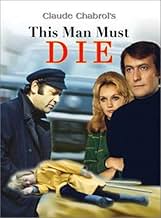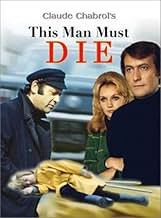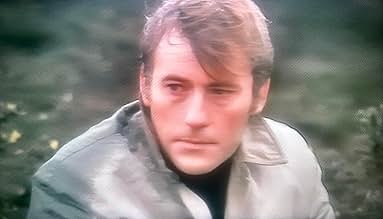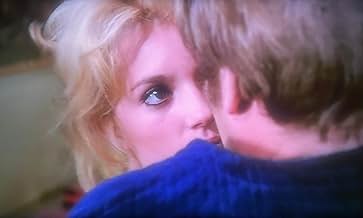IMDb-BEWERTUNG
7,6/10
5004
IHRE BEWERTUNG
Ein Mann behauptet sich im Leben einer Schauspielerin, von der er glaubt, dass sie irgendwie für den Tod seines Sohnes verantwortlich ist.Ein Mann behauptet sich im Leben einer Schauspielerin, von der er glaubt, dass sie irgendwie für den Tod seines Sohnes verantwortlich ist.Ein Mann behauptet sich im Leben einer Schauspielerin, von der er glaubt, dass sie irgendwie für den Tod seines Sohnes verantwortlich ist.
- Auszeichnungen
- 1 wins total
Handlung
WUSSTEST DU SCHON:
- WissenswertesThis film is based on a British novel of the 1930s written by the poet C. Day Lewis (under the pseudonym "Nicholas Blake") and is one of several novels by him to feature as its hero the brilliant amateur sleuth Nigel Strangeways. This adaptation, in addition to moving the action to modern-day France, entirely leaves out this leading character (or any new French character equivalent to him).
- PatzerAt the beginning Paul is shifting several times although the Mustang has an automatic transmission.
- VerbindungenFeatured in Das Kino bittet zu Tisch (2005)
- Soundtracks4 ernste Gesänge Op. 121
Music by Johannes Brahms (as Brahms)
Performed by Kathleen Ferrier (as Katleen Ferrier)
Disque DECCA ACL 306
Ausgewählte Rezension
In taking a slight cue from Alfred Hitchcock (one of Chabrol's heroes), but going another step further, This Man Must Die follows a logical turn of events for a single father who's son is run over in a hit and run by some cruel man in a fast car. In Hitchcock's hands this might be led by elegant stars, have even moments of scathing wit. But Chabrol's vision is a little darker, more that is seething under this surface, with the bourgeois as much of the commonplace as just the backdrop for the theater of revenge about to take place. But like the old master, Chabrol takes a twist with the material: as the father, Charles Thenier, going by an alias as a writer of children's books, gets more than acquainted with a woman who is the sister-in-law of the killer, gets to know the family more, and gets to know slimy, shrewd businessman and big-time garage owner Paul Decourt more, he's not really the only one out for his head.
As Chabrol goes further, it becomes a tale of Greek tragedy, or some variation on it. Paul's son, Philippe (a character as played by jean Yanne as if almost out of Bresson), hates his father with a passion, as his father has no respect for or tries to encourage his son with what he's got going on at school (perhaps conventionally, every scene with the father and son is a tense and violent outburst from father towards innocent son). One might think a collaboration might happen between the secretive, diary-writing Charles and the kind but frustrated kid, but this too isn't that simple. Chabrol also takes a smart tactic with that diary of Charles's; it could be just a narrative gimmick, and at times it feels as just that (maybe one of the film's only drawbacks, if only only on), but it does start to probe into a mindset that is one-track, and not without some reason in the genre sense. We're pitted on Charles's side, as he sneaks his way into Helen's heart, and then through her sometimes nice and other times (i.e. Paul's mother) savage in their verbal brutality.
But this same diary works as a something of a step-up from a psychological MacGuffin. Chabrol twists around with plot into motivation, and he pulls it off with his shooting and editing style, which applies just small, precise touches of the good old French New Wave into the proceedings (the occasional jump-cut, as any filmmaker knows, can't hurt under the right circumstances). What Chabrol's brilliant achievement is to transcend the trappings of a revenge film and to explore what the nature of malevolence brings past a simple crime- certainly these bastards have families, if they have the capacity to clear up their crimes with such skill like an owner of a hugely profitable auto-body/garage- and at the same time put a human angle into a plot that requires it. The actors do what they can (the man playing Charles, who I have not seen in other films, is very good in the lead, as is in his own right the man playing Paul Decourt, adding some layers to this rotten being), and despite some clunky scenes that do have to deal with the plot, there's some wit thrown in under the surface ("It's not a needle in a haystack, more like a needle in a box of needles,").
If This Man Must Die isn't a great film, and I'm not sure it is, it is at least a very successful example of finding some of the cracks in a revenge mystery, of adding that superlative mix of character into plot, and seeing what makes things like a diary, or a slip off a cliff, or an ambiguous ending, tick.
As Chabrol goes further, it becomes a tale of Greek tragedy, or some variation on it. Paul's son, Philippe (a character as played by jean Yanne as if almost out of Bresson), hates his father with a passion, as his father has no respect for or tries to encourage his son with what he's got going on at school (perhaps conventionally, every scene with the father and son is a tense and violent outburst from father towards innocent son). One might think a collaboration might happen between the secretive, diary-writing Charles and the kind but frustrated kid, but this too isn't that simple. Chabrol also takes a smart tactic with that diary of Charles's; it could be just a narrative gimmick, and at times it feels as just that (maybe one of the film's only drawbacks, if only only on), but it does start to probe into a mindset that is one-track, and not without some reason in the genre sense. We're pitted on Charles's side, as he sneaks his way into Helen's heart, and then through her sometimes nice and other times (i.e. Paul's mother) savage in their verbal brutality.
But this same diary works as a something of a step-up from a psychological MacGuffin. Chabrol twists around with plot into motivation, and he pulls it off with his shooting and editing style, which applies just small, precise touches of the good old French New Wave into the proceedings (the occasional jump-cut, as any filmmaker knows, can't hurt under the right circumstances). What Chabrol's brilliant achievement is to transcend the trappings of a revenge film and to explore what the nature of malevolence brings past a simple crime- certainly these bastards have families, if they have the capacity to clear up their crimes with such skill like an owner of a hugely profitable auto-body/garage- and at the same time put a human angle into a plot that requires it. The actors do what they can (the man playing Charles, who I have not seen in other films, is very good in the lead, as is in his own right the man playing Paul Decourt, adding some layers to this rotten being), and despite some clunky scenes that do have to deal with the plot, there's some wit thrown in under the surface ("It's not a needle in a haystack, more like a needle in a box of needles,").
If This Man Must Die isn't a great film, and I'm not sure it is, it is at least a very successful example of finding some of the cracks in a revenge mystery, of adding that superlative mix of character into plot, and seeing what makes things like a diary, or a slip off a cliff, or an ambiguous ending, tick.
- Quinoa1984
- 17. Feb. 2008
- Permalink
Top-Auswahl
Melde dich zum Bewerten an und greife auf die Watchlist für personalisierte Empfehlungen zu.
- How long is This Man Must Die?Powered by Alexa
Details
- Laufzeit1 Stunde 50 Minuten
- Sound-Mix
- Seitenverhältnis
- 1.66 : 1
Zu dieser Seite beitragen
Bearbeitung vorschlagen oder fehlenden Inhalt hinzufügen

Oberste Lücke
By what name was Claude Chabrol´s Das Biest muss sterben (1969) officially released in India in English?
Antwort




























